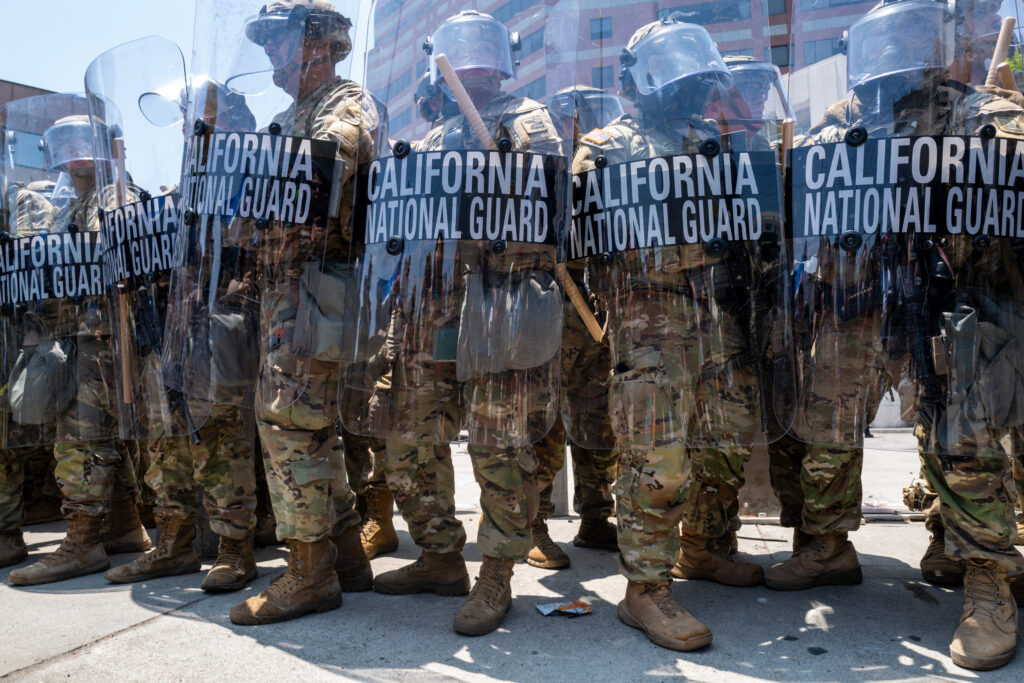Judge Says Trump’s Use of Military in Los Angeles Violated Federal Law

A federal judge ruled Tuesday that President Donald Trump’s use of National Guard troops and Marines in Los Angeles earlier this year violated a federal law that prohibits using the military as a domestic police force.
San Francisco-based District Judge Charles Breyer issued an order blocking the federal government from using military troops in immigration raids or other law enforcement operations in California.
Breyer, an appointee of former President Bill Clinton, wrote that Trump is using the military as “a national police force with the President as its chief.”
Breyer stayed his order, which enjoins further use of troops for law enforcement tasks in California, until Sept. 12.
Trump deployed thousands of California National Guard troops and Marines to Los Angeles in June in response to protests over his aggressive immigration raids throughout the city.
Breyer’s decision came after a non-jury trial last month over California’s claim that military troops accompanying federal law enforcement agents during operations in and around Los Angeles violated the Posse Comitatus Act of 1878, which generally bars the soldiers from engaging in civilian law enforcement operations.
California’s attorneys noted in the trial that the military force Trump sent to Los Angeles was larger than the number of troops deployed to Afghanistan three months after 9/11.
Legal experts noted that by pausing his own order until Sept. 12, Breyer may be preempting a stay from the Ninth Circuit Court of Appeals or the Supreme Court.
Though it doesn’t go into effect immediately, Breyer’s ruling may eventually have implications for how Trump uses the military in D.C., as he recently deployed hundreds of National Guard troops to assist federal agents in the nation’s capital.
Trump claimed that the National Guard deployment and surge in federal personnel in D.C. is necessary to address violent crime in the district, even as data from D.C. police show that crime is in decline.
During last month’s trial, California alleged that in deploying soldiers alongside police enforcing laws, the Trump administration violated Posse Comitatus by effectively assigning troops an “active, direct role” in law enforcement activities.
Trial testimony revealed close cooperation between the military and law enforcement agencies. Soldiers attended FBI briefings on upcoming arrests, set up traffic blockades and barriers for law enforcement operations and detained citizens on at least two occasions.
In his order, Breyer said evidence at trial showed that federal troops executed laws at Trump’s and Secretary of Defense Pete Hegseth’s orders.
“Defendants systematically used armed soldiers (whose identity was often obscured by protective armor) and military vehicles to set up protective perimeters and traffic blockades, engage in crowd control, and otherwise demonstrate a military presence in and around Los Angeles,” Breyer wrote.
“In short, Defendants violated the Posse Comitatus Act,” he added.
Department of Justice (DOJ) attorneys asserted that Trump did not violate Posse Comitatus because he was expressing his “protective power,” which they claimed is an inherent constitutional authority to use the military to protect federal property, personnel and functions.
The DOJ argued that the power — which is not explicitly found in the Constitution but is instead a legal interpretation of the Take Care Clause — is a “constitutional exception” to Posse Comitatus and allows troops to conduct certain activities that would normally violate the act.
In the trial, Breyer appeared alarmed by the DOJ’s argument and repeatedly asked the government to clarify if there were any effective limits on the president sending in the military to assist police enforcing laws.
In response, DOJ attorneys did not state any restrictions but insisted that the president’s protective power is an exception to Posse Comitatus.
Trump deployed the California National Guard after federalizing the troops over the objections of California Gov. Gavin Newsom (D) using an obscure, archaic federal statute. California sued, alleging that Trump’s mobilization order violated the statute.
In a previous order, Breyer agreed with the state and granted a temporary restraining order blocking Trump’s seizure of California troops. However, an appeals court days later stayed Breyer’s order and allowed Trump to keep using the troops.
Since June, the Trump administration has sent around 5,000 National Guard soldiers and Marines to southern California, and the troops assisted with over 170 law enforcement operations carried out by several different federal agencies, according to the Pentagon.
The operations included routine Drug Enforcement Administration counter-drug raids hundreds of miles away from the city.
Though the Pentagon has ended the deployment of many of the troops, hundreds of National Guard members remain active in Los Angeles.
While announcing the military deployment in D.C., Trump threatened to also send soldiers to New York, Baltimore, Chicago and Oakland — all cities run by Democrats.